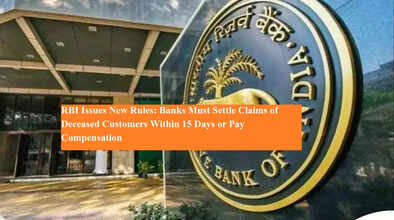RBI Issues New Rules: Banks Must Settle Claims of Deceased Customers Within 15 Days or Pay Compensation

The Reserve Bank of India (RBI) has introduced new guidelines that will significantly change the way banks handle claims related to deceased customers. Under the revised rules, banks must now settle claims for deposits and safe deposit lockers within 15 days of receiving all required documents. If there is any delay beyond this period, banks will have to pay compensation to the nominee or claimant.
Key Highlights of RBI’s New Guidelines
-
Faster claim settlement: Banks must close claims within 15 days once documents are submitted.
-
Compensation for delay:
-
For deposit accounts, banks will pay interest at 4% per annum (current bank rate) on the outstanding amount for the period of delay.
-
For safe deposit lockers, banks will pay ₹5,000 per day for every day of delay in handing over the contents.
-
-
Deadline for implementation: The guidelines, formally called the “Reserve Bank of India (Settlement of Claims of Deceased Depositors) Directions, 2025”, must be implemented no later than March 31, 2026, though banks are encouraged to adopt them earlier.
Simplified Process for Nominees and Survivors
If a bank account has a nominee registered or is opened with a survivor clause, the settlement becomes straightforward. In such cases, the bank must release the funds directly to the nominee or surviving account holder without unnecessary hurdles.
For accounts without a nominee or survivor clause, RBI has introduced thresholds for simplified processing:
-
₹5 lakh for cooperative banks.
-
₹15 lakh for all other banks.
If the total outstanding is below these thresholds, banks must use a simplified claim procedure. However, if the claim amount exceeds these limits, the bank may request additional documents such as a succession certificate or legal heir certificate before releasing the funds.
Rules for Safe Deposit Lockers
Apart from deposit accounts, the new rules also apply to claims related to safe deposit lockers and items held in safe custody. Banks must initiate the process within 15 calendar days of receiving all documents and coordinate with claimants to prepare an inventory of the locker’s contents.
Failure to adhere to this deadline will cost banks heavily — ₹5,000 per day of delay must be paid as compensation to the claimant.
Why These Rules Matter
Previously, claim settlement timelines varied widely across banks, often leaving grieving families stuck in bureaucratic processes. With these new RBI directions, the process will now be standardized, faster, and more customer-friendly.
This move is aimed at:
-
Improving customer service quality by eliminating unnecessary delays.
-
Protecting nominees and heirs from prolonged financial stress.
-
Ensuring accountability by imposing financial penalties on banks for delays.
What Claimants Should Know
-
Keep nominee details updated in all deposit accounts to simplify the settlement process.
-
For accounts without nominees, families should be aware of the bank-specific threshold limits.
-
In case of delays, claimants now have the right to demand compensation as per the new RBI rules.
Bottom Line
The RBI’s latest directive brings much-needed clarity and relief to millions of depositors and their families. By mandating a 15-day timeline and linking delays to financial penalties, the central bank has ensured greater accountability in the banking system.
From March 31, 2026, banks will no longer have the option to delay claim settlements indefinitely. Instead, nominees and legal heirs can expect timely access to funds and locker contents, and if banks fail to comply, they will be legally bound to pay compensation.
This reform is a major step towards making India’s banking services more transparent, responsive, and customer-centric

